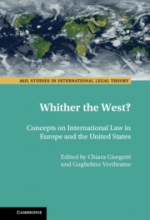Divergent Views on the Content and Relevance of the Jus ad Bellum in Europe and the United States?
in Chiara Georgetti and Giuglielmo Verdirame (eds), Whither the West? International Law in Europe and the United States (Cambridge University Press 2021)
This chapter studies the idea that Americans and Europeans hold different views on global security. Generally, it is considered that the EU side demonstrates a stronger adherence to positivism in international law, while the US adopts policy-oriented methodologies. This translates into different views of the actual content of the UN Charter rules on the use of force, for example of the permissibility of self-defense against attacks by non-State actors, calls for new exceptions to the prohibition of the use of force and in relation to controversial issues, such as the legality of the anticipatory self-defense. The chapter offers a critical look at the alleged difference by studying the US-led military coalition fighting against the so-called Islamic State (IS) in Iraq and Syria. This reveals a gradual acceptance of the more expansionist interpretation put forward by the US. Indeed, the case of the US-led military coalition against IS is one where European States - and several other western States - originally steered clear from murky legal grounds only to find themselves ultimately embracing an extensive reading of the right of self-defense, and relying for the first time, whether explicitly or implicitly, on the controversial “unable and unwilling” doctrine to justify military operations abroad.

